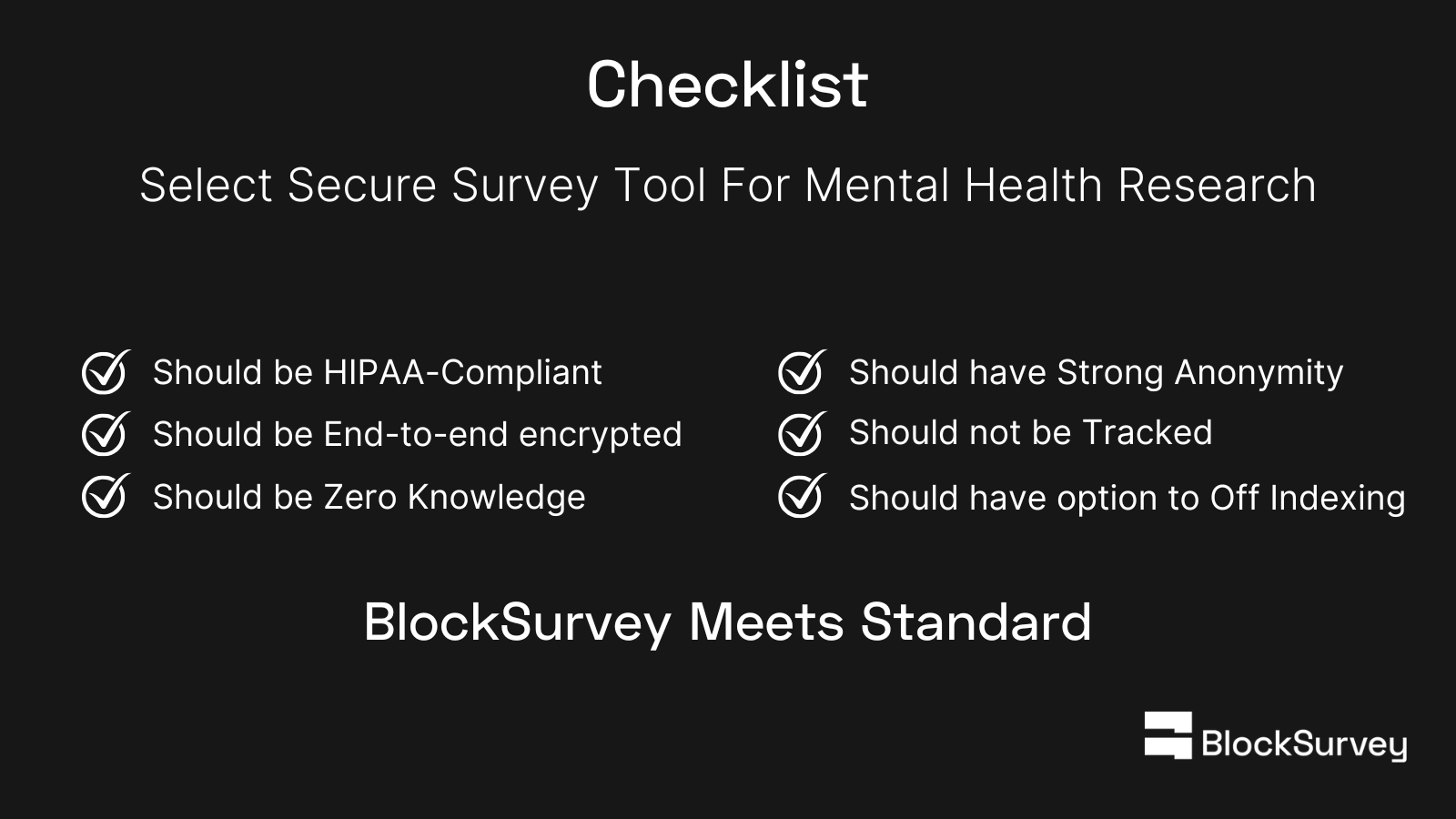Get insights.
Unlock value.
- 14-day free trial
- Set up in minutes
- No credit card required
Here's your Essential 6-Point Checklist to Select your Secure Survey Tool For Mental Health Research
The ultimate goal of mental health research is to uncover truths that can lead to better understanding, treatment, and support for those struggling with mental health challenges. However, patients are more likely to give honest & unbiased responses when they are assured of anonymity & data protection. How do we find a secure data collection tool that ensures anonymity & data protection for mental health patients?
In this blog, I write a handy 6-point checklist for you. It will help you select a secure survey tool for your mental health research.
6-Point Checklist: Secure Survey Tool For Mental Health Research
1. Should be HIPAA-compliant
Each & every Protected Health Information (PHI) that you receive from mental health patients is very sensitive. The HIPAA-compliant platform makes sure PHI is handled with sensitivity. Protecting privacy is not a checkbox, it is a commitment & that is offered through HIPAA compliance. This compliance helps you build trust with your mental health patients & also avoid hefty penalties.
2. Should have End-to-end encryption
Select an end-to-end encrypted survey tool designed with a privacy-first approach. All the data should be encrypted both at transit & at rest. End-to-end encryption will add maximum security to the response provided by mental health patients.
3. Should have Zero Knowledge Architecture
Select a survey tool with Zero Knowledge architecture. Zero Knowledge ensures no one can see your data, not even the survey platform provider. You will have complete ownership of your patient data. With this architecture, your patients will feel secure which leads to greater engagement.
4. Should have Strong Anonymity
The survey platform should have strong anonymity. An Anonymous Seal feature that helps you create completely anonymous surveys. By making your survey anonymous, you cannot ask for Personally Identifiable Information (PII) like email address, phone number, country & other demographic information.
5. Should not have Trackers
The data collection platform should not have any trackers, ads, or cookies that are likely to compromise patient privacy. This ensures confidentiality & security and increases trust with your patients. You can run mental health research surveys without worry when there are no trackers.
6. Should have Option to Off Search Engine Indexing
If you are protective of your mental health research and do not want even search engines to index your survey, then your survey platform should have the option to switch off indexing before publishing the survey. This ensures surveys don’t appear on the Search Engine results page.
BlockSurvey meets the Standards
BlockSurvey stands out as a solution that complies with the above 6-point checklist.

It is the ideal secure mental health research survey tool. Do you know? All traditional survey tools lack these features.
Remember, by selecting BlockSurvey, you're not just choosing a survey platform – you're investing in a secure, privacy-focused environment that prioritizes the well-being of your mental health research participants and the integrity of your findings.
BlockSurvey provides the assurance and capabilities you need to advance mental health research responsibly and ethically.
Here's your Essential 6-Point Checklist to Select your Secure Survey Tool For Mental Health Research FAQ
How can researchers boost survey response rates in mental health?
Low response rates can significantly impact the validity of survey results. To improve participation: -Establish trust and credibility -Offer incentives -Make the survey accessible in multiple languages -Keep the survey concise and focused -Send reminders
Besides anonymity, what other elements can enhance participant trust and encourage honest responses in mental health surveys?
Beyond anonymity, consider also these elements: -Transparency about data usage -Emphasize the importance of honest answers -Include a debriefing section -Use a professional and user-friendly survey platform
What types of survey questions are most effective for gathering sensitive information about mental health while minimizing respondent discomfort?
When dealing with sensitive mental health topics, the phrasing and format of survey questions are crucial. Consider the following: -Use clear, simple language -Provide response options that cover a range of experiences -Incorporate "prefer not to say" options -Use indirect questioning techniques when appropriate -Pilot test your survey
Get insights.
Unlock value.
- 14-day free trial
- Set up in minutes
- No credit card required


